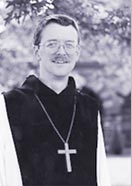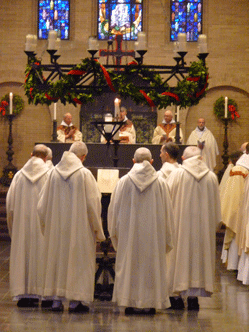
 |

|
|||
|
Zooey saw the kitchen as a church, his mother as a kind of priest, the soup as blessed, the welcome for Franny as God’s greeting. Is Zooey right in thinking like this? Is he going to far? No; I would says he is dead right! Why do we limit God? Where does this tendency of ours to limit and contain God come from? ‘God is my God’, we instinctively think. ‘God is here and not there.’ But Epiphany is the celebration of the continuing effects of the Incarnation. It’s as if Christmas is the epicenter of an earthquake with continuing tremors and aftershocks that expand throughout time and the universe. Maybe we could feel an aftershock or two this morning. “When Jesus was born in Bethlehem of Judea, in the days of King Herod, be-hold, Magi from the east arrived in Jerusalem, saying, ‘Where is the newborn king of the Jews? We saw his star at its rising and have come to do him ho-mage.’” Scholars have labored to discover what Matthew’s ‘star’ might have been. Everything from Halley’s Comet to some kind of supernova has been suggested. Most likely it was the conjunction of the planets Jupiter and Saturn aligning themselves with each other, which they did three times in 7 BC. This in no way invalidates Matthew’s allusion to the Book of Numbers, which speaks of a star “arising from Jacob”, a phrase that refers to the Messiah’s coming from David’s lineage. 
We really can’t be certain if celestial happenings are why the ‘wise and learned’ men came from the East. Matthew is definitely not offering us the kind of cozy, picture-book story that we have created for ourselves out of it, with strange but gentle Oriental kings bringing gifts to a child in a stable. Matthew, in fact, says nothing about a stable; as far as we know from his gospel, Mary and Joseph were living in Bethlehem at the time, only moving to Nazareth later. Nor does Matthew say the visitors were themselves royal. The word ‘Magi’ covered a wide range of people that practiced the occult arts: astronomers, fortune-tellers, priestly augurers and Magicians of varying degrees of plausibility. Matthew himself is probably thinking of astronomers. The Magi’s arrival on the scene of the infancy narrative introduces us to something which Matthew wants us to be clear about from the start, namely that, even though Jesus is king of the Jews, that doesn’t mean his rule is limited to the Jewish people. At the heart of many prophecies about the coming Messiah/King, there were predictions that his rule would bring God’s justice and peace to the whole world.
|
This universalism points ahead to the climax of Matthew’s gospel, where Jesus stands before Pilate’s soldiers. These soldiers are the first Gentiles since the Magi to call Jesus ‘king of the Jews’. But they don’t offer him precious gifts. They crown him with thorns and put him on the throne of the cross. And at that moment of enthronement, instead of a bright star there will be an unearthly darkness, out of which we shall hear a single Gentile voice: “Truly this man was the Son of God.” In fact, Matthew goes on to end his gospel with Jesus commissioning his followers to go out and make disciples from every nation. My brothers and sisters, this universalism is more than a geographical reality. It is more than an ethnic reality. It is a moral reality. A cosmic reality. An ontological reality. God has truly become human so that we, human beings, through the sheer gift of God, may become what God is by nature. 
I go back to my opening question: Why do we tend to limit God? Contain God? Confine God? I’ll respond to my own questions with another question: How far did God go? What limit did God put on himself? Within what boundaries, confines or barriers did God stay? There are none! None whatsoever! God has traversed all distances. God has broken through all barriers. Even the barrier of sin. “Where sin has abounded, grace has abounded even more.” This is the height, the depth and the breadth of the universalism that we celebrate in the Christmas/Epiphany mystery. You know, sometimes all this talk of universalism can sound somewhat ab-stract, ethereal, remote, way out there somewhere. And so I’d like to end by bringing this universalism of God’s self-gift closer to home. I began with J.D. Salinger’s Franny and Zooey and a cup of chicken soup. I’d like to leave you with a slice of Irish soda-bread. One day the celebrated Jewish violinist Yehudi Menuhin was walking down the corridor of a music academy and came across a young Irish student having his lunch. Not recognizing the soda bread sandwich, he asked Liam what he was eating. “Bread, sir,” the wee lad replied. “Me Ma sent it.” The great man smiled and walked on. But he kept reflecting on an Irish mother pouring her love into the dough she was kneading for her beloved son, away from home for the first time. He imagined her baking it, posting it overseas, and homesick Liam slicing it, buttering it and eating it—eating it with great gusto. Menuhin’s imagination was sublimely sacramental and incarnational, yet in-spired by something so commonplace, so ordinary—the bread of life wrapped in brown paper, tied with a piece of string and posted from Connemara! In this very ordinary, everyday, homely moment, the musician recognized the love hidden like yeast in the dough; the bread behind the bread; the horizon behind the horizon; the mystery of the whole world in the body of a child; the unity of everything in God. Today we don’t need to bring gifts of gold, frankincense and myrrh. We only need to be remain open; open to receive the gifts of a cup of chicken soup and a slice of Irish soda-bread. A Blessed and Boundless Epiphany to you all!
Epiphany Sunday, January 3, 2010 - Dom Damian Carr, O.C.S.O.
|
|||
|
Home | Back to Top | Contact Us | Links |